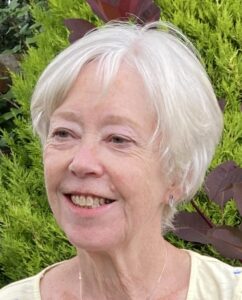On International Women’s Day, members of the Scottish Episcopal Church today share their perspectives as we celebrate the social, economic, cultural, and political achievements of women.
The day also marks a call to action for accelerating women’s equality, and this year’s campaign theme is ‘Inspire Inclusion’.
Earlier today we featured contributions from the clergy and the Provincial Youth Committee (links at foot of this article). Here, we feature a lay person’s perspective from Dr Elaine Cameron, who highlights the importance of women being directly involved peace-building, which is recognised across faith communities.
“When we were in the US, nearly twenty years ago, I stumbled on The Faith Club, a remarkable book describing the searingly honest friendships of three women, one from each of the Abrahamic faiths: Ranya, a Muslim of Palestinian origin, Priscilla a Jew, and Susanna, a Christian, writes Dr Cameron, pictured. “In the months after September 11, 2001, Ranya found herself facing constant questions about Islam from her children, the only Muslims in their classrooms. So she sought mothers from the other faiths to try to understand and answer her children’s questions.
“But the friendships nearly didn’t happen! Priscilla was incensed by what she heard in Susanna’s description of the crucifixion. They realised quickly that they each carried stereotypes and misunderstandings about their faiths. It is as they revealed their deepest beliefs that we witness the blossoming of their interfaith friendship, and a new way of relating, in peace.
“I was reminded of this book on Tuesday this week, at the Religions for Peace UK seminar with three outstanding women, Isadora Quay, Nighet Nasim Riaz and Sally Foster-Fulton, currently Moderator of the Church of Scotland (main picture). Isadora is a member of the Bai-hai faith, and Nighet is a Muslim. Asked what were the main issues for women today, all agreed that peace-building is important. Too often, women are not there, so they need to be intentional – be aware that it is not only the glass ceiling but the glass walls which can prevent their voices being heard. They thought we needed to undermine our sense of privilege – whether from class, culture, gender or age.
“Indeed, despite the fact that women suffer most in war, too often the active participation of women at peace-building has been hampered because of pre-existing cultural norms: gender-based violence, the underestimated plight of women in conflicts, a gendered approach to peace-building efforts, and the barriers in front of women’s active participation in decision-making processes.
“How good it is to recognise that the same spirit is at work in different faith communities as well as in our own. As others have said, we do not take God to others: God accompanies us to this holy ground.
“It is especially heartening to hear an extract from this prayer from Rabbi Irwin Keller, composed ten days after the Hamas action in Gaza:
Today I am taking sides.
I am taking the side of Peace.
Peace, which I will not abandon
even when its voice is drowned out
by hurt and hatred,
bitterness of loss,
cries of right and wrong.
I am taking the side of Peace
whose name has barely been spoken
in this winnerless war.
I will hold Peace in my arms,
and share my body’s breath,
lest Peace be added
to the body count.
Dr Elaine Cameron is a member of St John the Baptist in Perth and the Diocese of St Andrews, Dunkeld & Dunblane Environment Group
More on International Women’s Day:

